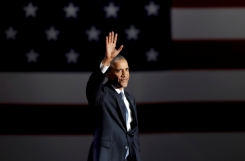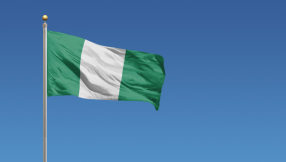Speaking during his final press conference yesterday, the outgoing President Barack Obama paid tribute to the press and its role in words that contrasted dramatically with the approach to the media of his successor.
"I have enjoyed working with all of you. That does not, of course, mean that I've enjoyed every story that you have filed, but that's the point of this relationship," Obama said. "You're not supposed to be sycophants, you're supposed to be sceptics, you're supposed to ask me tough questions. You're not supposed to be complimentary, but you're supposed to cast a critical eye on folks who hold enormous power and make sure that we are accountable to the people who sent us here, and you have done that."
It was characteristic grace from a man whose various farewell events in recent weeks have been overshadowed by a battering in the media over his legacy, amid claims he has gone from hero to zero.
And it is true, of course, that the thrill of optimism that shone through his initial campaign in 2008 – the chants of "Yes we can" against the backdrop of the first black president, and a civilised and intelligent person at that – has evaporated with the harsh reality of what Harold Macmillan called "events".
The chief "event" that threatens the legacy of Obama's eight years in office, according at least to the mainstream media, is that of the war in Syria.
And it is reasonable primarily to assess Obama's foreign policy given the fresh, idealistic start his '08 victory gave America and the rest of the world. After all, he (unlike Hillary Clinton and the rest of the Washington establishment) had opposed the disastrous invasion of Iraq in 2003.
Yet is it fair to compare, as I happened to see BBC World (a bastion of conventional wisdom) repeatedly do last week, Obama with his immediate predecessor George W Bush who instigated that war?
The key criticism is over Obama's "failure" to act against Syria's President Bashar al-Assad after the latter deployed chemical weapons in Damascus in August 2013, killing nearly 1,500 civilians, including more than 400 children, despite Obama saying a year earlier on August 20, 2012: "We have been very clear to the Assad regime, but also to other players on the ground, that a red line for us is we start seeing a whole bunch of chemical weapons moving around or being utilized. That would change my calculus. That would change my equation."
Yet is it as simple as that? True, this comes as close as Obama got to a broken promise while president. And arguably more importantly, Syria remains in flames, an unbearable geo-political stain where, despite several abortive ceasefires, the bloodshed shows no sign of abating.
But if we are assessing the presidency of Obama as an individual, it is reasonable to ask whether anyone else could have done any better, especially in the face of major opposition to war from Congress and the public.
As has been argued by the former Pentagon staffer Derek Chollet in his bookThe Long Game: How Obama Defied Washington and Redefined America's Role in the World:
Despite the administration's strong advocacy and support from a small minority of hawkish politicians, Congress and the American people proved strongly opposed to the use of force. In the end, however, the threat of military action and a surprise offer by Russia ended up achieving something no one had imagined possible: the peaceful removal of 1,300 tons of Syria's chemical weapons...By October 2013, without a bomb being dropped, the Bashar Assad regime had admitted having a massive chemical weapons program it had never before acknowledged, agreed to give it up and submitted to a multinational coalition that removed and destroyed the deadly trove...many...criticize the policy less for its outcome than for the way it came about...Far from a failure, the "red line" episode accomplished everything it set out to do—in fact, it surpassed our expectations. But the fact that it appeared to occur haphazardly and in a scattered way was enough to brand it as a failure in Washington's eyes.
Elsewhere on foreign policy, it is worth remembering that in 2011 Obama oversaw the killing of Osama bin Laden while withdrawing troops later that year from Iraq, where the US had misguidedly reacted to the events of September 11, 2001. In 2014, Obama withdrew the military from Afghanistan, too. The following year, Obama brokered a historic peace agreement with Iran, leading to the United Nations lifting economic sanctions imposed since 2010.
Aside from Syria, of all the major intractable policy challenges in the world, only the quest for elusive peace between Israel and the Palestinians remains largely untouched.
No area better demonstrates the failure of Obama to live up to the idealism of before, which in turn was shown in his historic, bridge-building 'Cairo speech' entitled 'A New Beginning' in 2009, which gave so much hope to the Muslim world after Bush.
But on the Israel-Palestine question, real blame for lack of progress in the dormant so-called 'peace process' surely lies at the feet of Israel's right-wing Prime Minister Benjamin Netanyahu, with whom Obama suffered very poor relations indeed, not least thanks to his aforementioned deal with Iran. Whether Netanyahu will change the approach of a lifetime and seek a peace deal with the Palestinians under a new US presidency remains to be seen.
Domestically, Obama was – not unlike Gordon Brown, soon after he became UK prime minister in 2007 – immediately blown off course by a major economic crash out of his control.
But with a $787 billion economic stimulus package in February 2009, which cut taxes while extending unemployment benefits, Obama rescued the economy and oversaw a return to growth by July that year. As Brown bailed out British banks, Obama bailed out the US auto indusry in March 2009. And, putting Britain to shame, Obama comprehensively regulated the major banks with a major reform act in July 2010.
By now, of course, the president had introduced "Obamacare", the measure of which he is most proud and one which, depending on whether it is abolished by the Republicans, will surely act as his most lasting domestic legacy. By 2014, 95 per cent of Americans had health insurance.
Meanwhile, more people – some 22.3 million – have gone into work under Obama's administration than that of any other president in US history.
What, then, of Obama the individual. What kind of America did he represent?
He is undeniably a class act, a man with high emotional intelligence who wept many times over the gun massacres which he has said were his biggest regret.
Contrary to jibes by his opponents about being a Muslim or not being born in the US, Obama is a patriotic American with a deep and thoughtful Christian faith.
In the end, Obama's sheer class, and ability to inspire, to capture the imagination, and to make America feel at ease with themselves, were perhaps best shown when he famously sang Amazing Grace during the memorial to pastor Clementa Pinckney at Charleston in June 2015.
Contrary to conventional wisdom, grace is perhaps the word that best describes Obama's character. In the face of eight very tough years in the job, and onslaughts from the media and Donald Trump in particular, he showed grace.
Amazing grace.














